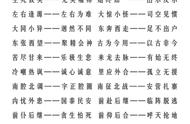Unit 7 Teenagers should be allowed to choose their own clothes.
第1课时 Section A(1a2d)
safety[来源:学_科_网Z_X_X_K]
n. 安全;安全性。其形容词形式为safe(安全的)
smoke
v. 吸烟;冒烟。 n. 烟
get ears pierced
打耳洞
stop doing sth.
停止做某事
be excited about
doing sth.
对做某事感到兴奋
【拓展】 (1)get ears pierced中get用作使役动词,相当于make或have, “get/have+宾语+过去分词”意为“使某事被做”或“让某人做某事”。如:
I get my car repaired.=I have my car repaired. 我让别人修好了我的车。
(2)stop to do sth. 停下来去做另一件事。 如:
Please stop to have a rest. 请停下来休息一下。
☆I don't think sixteenyearolds should be allowed to drive. 我认为不应该允许十六岁的孩子开车。
(1)“I don't think”为否定前移,否定的内容为后面从句的内容。
在带有宾语从句的复合句中,如果主句的谓语动词是think, believe, suppose, expect, guess等表示“观点;推测”等概念的词,且主句的主语是第一人称,从句的否定词往往移到主句中。如:
I don't think my book is here. 我认为我的书不在这里。
(2)sixteenyearolds 是由连字符连接的合成名词,意为“十六岁的孩子”。
(3)allow sb. to do sth. 允许某人做某事。其被动结构为: be allowed to do sth. (被允许做某事)。should be allowed to drive为含有情态动词的被动语态。如:
We shouldn't be allowed to eat in the classroom.应该禁止我们在教室吃东西。
第2课时 Section A(3a3c)
cry
v. & n.哭;叫喊。其反义词为laugh (笑)
lift
v. 举起;抬高。 n. 电梯;搭便车。常用短语:give sb. a lift 让某人搭便车;lift sb./sth. up 将某人/某物抬起、举起
badly
adv. 严重地;差;非常。其形容词形式为bad,比较级为worse,最高级为worst
awful
adj. 很坏的;讨厌的
regret
v. & n.感到遗憾;懊悔
【拓展】 (1)cry的相关短语
①cry for help 呼喊求援/求助。如:
She had an traffic accident just now and she is crying for help. 她刚发生了交通事故,现在正在呼喊救命。
②cry for sb./sth. 哭着要某人/某物。如:
The little baby often cries for toys. 这个小孩经常哭着要玩具。
③cry about/over sth. 为某物而哭泣。如:
Susan is crying about the loss of her pet. 苏珊正在为失去自己的宠物哭泣。
(2)regret的具体用法
①regret to do sth. 意为“遗憾要做某事”,表示事情未做。如:
I regret to have to do this, but I have no choice. 我很遗憾必须这样去做,但我没有其他选择。
②regret doing sth. 意为“后悔做了某事”,表示事情已做。如:
I don't regret telling her what I thought. 我不为告诉她我的想法而后悔。
③regret+that/wh 从句。如:
I have deeply regretted what I said. 我非常后悔说了那些话。
talk back
回嘴;顶嘴
think
back to
回想起;回忆。与其含义类似的短语: remind of 提醒;记起;使回想起
【拓展】 (1)talk with sb. 和某人说话。如:
I saw him talking with Alen on my way home. 我在回家的路上看到他正和艾伦说话。
(2)talk about sth. 谈论某事。 如:
What are they talking about? 他们在谈论什么?
☆When I was two running through the field, she made sure I was safe and kept me from danger. 两岁那年,当我在田野奔跑的时候,她确保我是安全的,并使我远离危险。
make sure表示“把事情弄清楚;核实;查证”。常用于祈使句,后面常接that宾语从句,意为“弄明白;确信”。如:[来源:Z。xx。k.Com]
Make sure that you put down every word she says. 请确保你记下了她说的每一个字。
【拓展】 (1)make sure of/about sth. 确定某事;核实某事。如:
Please make sure of the time. 请核实时间。
(2)make sure (what/how/when) to do sth. 确定做某事。如:
Make sure to get here before 8:00 a.m. tomorrow. 请确保明天早上八点前到这。
You should make sure when the train will leave. 你应该查明那趟火车什么时候开出。
(3)keep sb. (away) from 相当于stay away from,意为“使某人远离……;避免接近;远离”。相关短语有: keep away from sth. 使某人远离某事/物; keep/stop sb. from doing sth. 阻止某人做某事。[来源:学*科*网Z*X*X*K]
第3课时 Section A(Grammar Focus4c)单元语法精讲
被动语态(三)
含有情态动词的被动语态:
肯
定[来源:学§科§网]
句
主语+情态动词+be+过去分词(+by…)…
All these books could be lent to the students. 所有这些书都可以借给学生。
否
定
句
主语+情态动词+not+be+过去分词(+by…)…
The work needn't be done at once. 这项工作没必要立即做。
These books mustn't be taken out of the reading room. 这些书不能被带出阅览室。
一
般
疑
问
句
情态动词+主语+be+过去分词(+by…)……?
Must the work be done at once? 这项工作必须立即完成吗?
特
殊
疑
问
句
特殊疑问词+情态动词(+主语)+be+过去分词(+by…)……?
When should my car be repaired?我的车什么时候能修好?
Who should be asked to answer the question? 应该请谁回答这个问题呢?
含情态动词的主动语态变被动语态的变化步骤:(以should为例,见下图)
第4课时 Section B(1a1e)
sometimes
adv. 有时(表频率)
【拓展】 often, always, usually和never等都是常见的表频率的副词。 sometime指未来的某时; some time 指一段时间;some times指几次,常用 several times代替。
巧记口诀:分开是“一段”(some time),相连为“某时”(sometime);分开s是“倍;次”(some times),相连s是“有时”(sometimes)。如:
He went out some time after their leaving. 他们走后不久,他就出去了。
What I meant was that you can find it sometime during the week. 我的意思是说不定你可以在这个星期的某个时候找到它。
Everyone will make the mistakes some times during the working. 每个人工作期间都有犯一两次错的时候。
I sometimes go to the cinema with my parents on weekends. 我周末有时会陪父母去看电影。
fail a test
考试不及格
be strict with sb.
对某人严格要求
【拓展】 (1)finish a test early提前交卷; pass the test 通过考试;take the test later 补考。
(2)be strict in sth.“对某事严格要求”,其宾语通常为物。如:
Mr. Zhang is always strict in his work. But he isn't strict with his daughter. 张先生总是对他的工作要求严格,但是他对他女儿要求不严格。
第5课时 Section B(2a2e)
support
v. & n. 支持。常用短语: give support to…为……提供帮助;支持/支援……
enter
v. 进来;进去。既可用作及物动词,也可用作不及物动词,且通常不用于被动语态。其名词形式为entrance
choice
n.选择;挑选。其动词形式为choose。常用短语:make a choice
【拓展】 (1)enter也可表示“考上(学校或大学);开始从事(某职业);加入(某组织)”,此时enter是及物动词。
(2)enter在计算机领域中可表示“输入(信息)”,此时是及物动词;也可表示“进入(计算机系统)”,此时既可用作及物动词,也可用作不及物动词。
get in the
way of
挡……的路;妨碍
be serious
about…
对……认真。about为介词,后接名词、代词或动名词作宾语[来源:学科网ZXXK]
【拓展】 way的常用短语:
on the way to…在去……的路上。by the way 顺便说一下。in this way 用这种方法/方式。in a way 在某种程度上。
☆Of course we want to see him achieve his dreams. 当然,我们想看到他实现他的梦想。
(1)achieve一般只用作及物动词,其宾语可以是实现的目标、目的等,也可以是取得的胜利、成功、名誉、地位等。如:
Everybody should be given the chance to achieve their aims. 要让每个人都有机会实现自己的目标。
(2)因achieve一般与令人愉快的事 (如成功、成就等)连用,所以平时不要受汉语的影响用此词来表示一般意义的“达到”。
(3)achieve的名词形式为:achievement 成就;成绩。如:
He was rewarded by the government for his scientific achievements. 他因在科学上取得的成就受到政府奖励。
☆ We have nothing against running! 我们并不反对赛跑!
(1)against prep. 反对;违背。其反义词为for,意为“支持”。如:
There are 26 votes for him and 8 against him. 有26票赞成他,8票反对他。
(2)against用在fight, strive, struggle等词后面,同with意思相同,不过against更强调一种困难中的反抗。如:
We fight for the weak against the strong. 我们支持弱者反对强者。
(3)against作为介词时,后面接的宾语有时可省略。如:
He had intended to come but somehow decided against (it). 他本来打算来,但不知何故他决定不来了。
☆He needs to spend more time on his homework because it is difficult to become a professional sports star. 他需要在作业上多花点时间,因为成为一名职业运动明星是很难的。
这是一个because引导的原因状语从句,从句部分的it是形式主语,真正的主语是动词不定式to become…。这种句型结构可总结为:it is +adj.(+for sb.) +to do sth.,意为“对某人来说,做某事怎么样”。如:
It is important for teenagers to learn to think for others. 对青少年来说,学会为他人着想很重要。
☆ Only then will I have a chance to achieve my dream. 只有那样我才会有机会实现我的梦想。
only位于句首表强调,后面的句子需要倒装。如:
Only then did he understand it. 直到那时,他才明白。
,














